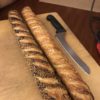Everyone knows that coffee and tea are frenemies. They hang out with each other all the time, so they have to be civil with each other, but they’re actually fiercely competitive. So, when coffee learned about the growing popularity of kombucha, the fermented tea, it needed to get in on that game. The result is Coffer. That is, coffee plus fermentation. Assisting coffee in this endeavour is Kevin Chen who created and bottles Coffer. It’s a big hit in his hometown of Austin, Texas.

Brendan Francis Newnam: Thank you for bringing Coffer to our studio, but did the world really need this?
Kevin Chen: I think so.
Brendan Francis Newnam: We have so many caffeine delivery systems already in society. Why do I need Coffer?
Kevin Chen: I think, in Coffer, you’ve got the caffeine, and you have got the fermentation, and you have got the carbonation. Three different worlds. We’re finally kind of combining all three together.
Brendan Francis Newnam: What’s wrong with normal coffee?
Kevin Chen: Oh, there is absolutely nothing wrong with normal coffee! We are just kind of taking coffee and sprucing it up a little bit.
Brendan Francis Newnam: What’s wrong with cola?
Kevin Chen: There is nothing wrong with cola. I think a difference between Coffee and cola is the number of calories you find is a cola versus here. Cola typically uses a lot of sweetener. Our’s is only 50 calories.
Brendan Francis Newnam: What is in Coffer?
Kevin Chen: In Coffer there are four main ingredients: there is water, there is coffee, there is sugar, and there is yeast. That’s all there is in there.
Brendan Francis Newnam: Some other companies make carbonated coffee. First of all, full disclosure, I’m a tea drinker – I do turn to coffee in emergencies – but I am aware from going to coffee shops where I work a lot that there are other carbonated coffees on the market. Right? This is a tiny, tiny piece of the larger coffee market, but people are expanding into this.
Kevin Chen: Yeah, I would think so. Within the coffee market, there are the specialty coffees. And maybe within the specialty coffees there is even more specialty. And I would say maybe we fit in that ‘more specialty.’
Typically, coffee isn’t carbonated. But, for the most part, coffee isn’t cold. I feel, recently, the cold brew coffee interest has really grown. We’ve taken that cold brew coffee and taken it to a different level. Where, instead of just serving it cold on ice, whe have it carbonated, naturally.
Brendan Francis Newnam: If I understand correctly, one of the reasons people like cold brewed coffee is that it’s smoother, it has less acid.
Kevin Chen: Yes, that’s right. It’s a lot smoother. It’s not as acidic or as harsh on the palette or the stomach.
Brendan Francis Newnam: So this is naturally carbonated. How does natural carbonation happen?
Kevin Chen: For natural carbonation, the two ingredients you need are the sugar and the yeast. Mix the sugar and the yeast together, and we let it sit, and you’re left with a product which is naturally carbonated. The bubbles are significantly finer than something you find in maybe a beer or a soda.
Those are something, you’ll typically find, that is force-carbonated, where you inject CO2, and let the carbon dioxide mix with it. That’s actually kind of how we started this process. We took cold brew coffee, injected it with CO2 in one of those home soda machines, and what we found was it actually make a smooth coffee really bitter, so we experimented with different ways of getting a carbonated coffee and we came across this.
Brendan Francis Newnam: When you talk about the carbonation process, it sounds like a fermentation process. Isn’t that beer? What makes this not beer? Are you sure it’s not beer?
Kevin Chen: We have tested it and we made sure. In order to make alcohol, you need sugar, yeast, and time. We have two of those three.
Brendan Francis Newnam: Alright. Let me open one of these up. It just so happens we have a beer opener here at Dinner Party Download Headquarters. It smells great. Smells chocolaty, it’s got interesting notes. Are you just jacked all the time on coffee?
Kevin Chen: My typical coffee consumption is usually one cup a day. For me, to my body, a bottle of Coffer is more like two cups of coffee. So I do get that jitteriness. I think it’s more of the rate at which I consume it, versus the quantity.
Brendan Francis Newnam: Well, let’s drink this. I’m going to pour it. It looks like cola, smells like coffee and chocolate. I’m going to take a sip here. It’s interesting. I didn’t think… Like, seeing it, I think it’s going to be sweet. Drinking it, I remember it’s coffee, it’s not going to be sweet, yet it’s not bitter at all. If the sugar that you use to ferment this kind of still playing a role at this point?
Kevin Chen: We call this a ‘faintly sweetened’ coffee. There is a little bit of residual sugar to make it a little more palatable. It’s just the right balance of sugar to be able to balance well with the carbonation process.
Brendan Francis Newnam: This is probably going to do better in regions where it’s hot?
Kevin Chen: It was pretty great when we launched this product in July in Austin, where the summers are pretty brutal. It worked really well as a nice, cold coffee alternative.
Brendan Francis Newnam: New York, come January, it’s not like, “Let’s get inside and split… a cold cup of Coffer.” I don’t know if that’s gonna happen.
Kevin Chen: I’m sure you can put it in the microwave and see what happens.


